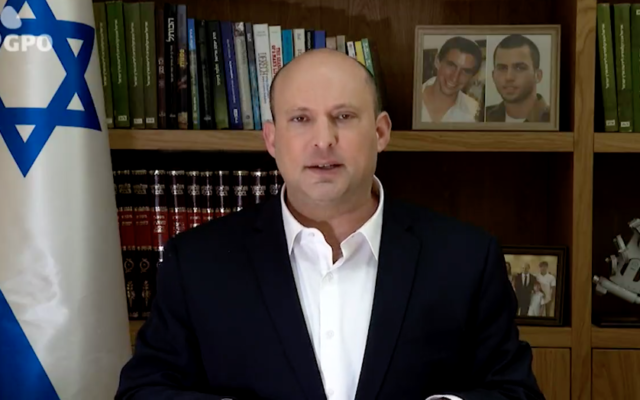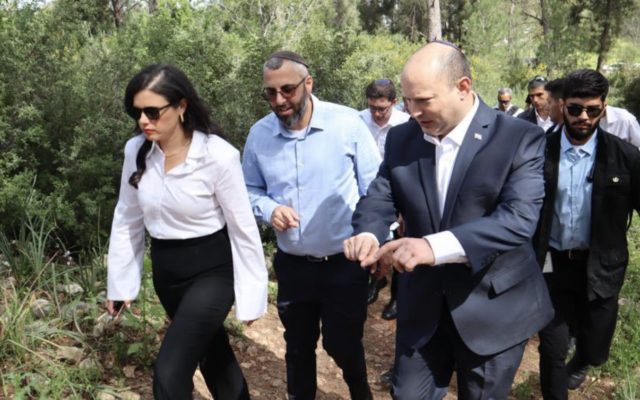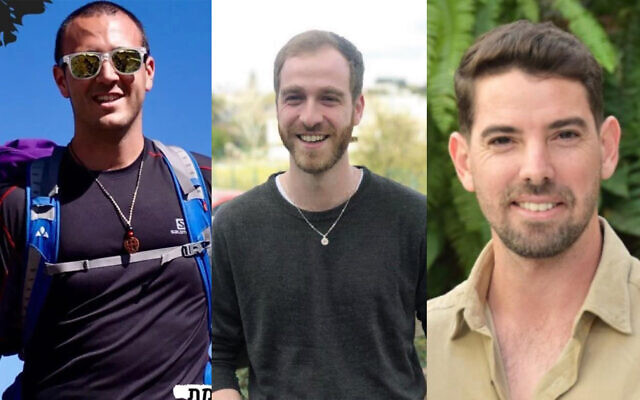Ten months after being appointed to the highest office in the land, Israeli Prime Minister Naftali Bennett’s eight-party coalition government is wobbling and living on borrowed time, having lost its wafer-thin majority in parliament at a fraught moment when Israel is coping with an upsurge of terrorism.
Since March 22, 12 Israelis and two foreign workers, both from Ukraine, have been killed in attacks mounted by three Israeli Arab citizens and two Palestinian Arabs from the West Bank.
Idit Silman, a 41-year-old Orthodox politician from Bennett’s far- right Yamina Party, ignited the political crisis on April 6 after abruptly resigning as the government’s chief whip. In a letter to Bennett, she urged him to ditch his cabinet and form a “national, Jewish and Zionist” government.
Silman’s stunning decision to abandon Bennett leaves him in a vulnerable position.

With only 60 Knesset seats now at his disposal, Bennett is skating on very thin ice. He can only pass legislation with the backing of the opposition. And if another member of his coalition bolts, his government would fall, ushering in a fresh period of instability and the fifth general election since 2019.
Opposition leader Benjamin Netanyahu is rubbing his hands in glee, hoping that Silman’s defection could be his ticket back to the premiership.
This may not necessarily be true.
Shortly after Silman’s defection, Netanyahu urged right-wingers in the government, such as Interior Minister Ayelet Shaked and Justice Minister Gideon Saar, to “put aside old grudges and return to the national camp.”

Lambasting Bennett’s coalition as “flaccid, soft and dangerous,” Netanyahu claimed it is “weak” on Iran and Palestinian terrorism. “It’s time for unity,” declared Netanyahu, who is standing trial on charges of corruption. “Join Idit, join us. It’s time to come home.”
Netanyahu’s nationalist, self-serving appeal may have struck a chord among some right-wingers, but the cards he holds may not catapult him back to power. The current coalition was formed due to widespread personal antipathy toward him. And lest it be forgotten, he failed no less than three times to cobble together a viable government after three inconclusive elections.
In light of these factors, his chances of replacing Bennett remain rather dim at this juncture.
At present, Netanyahu and his allies simply do not have the votes to dissolve the Knesset, topple Bennett, and resurrect his premiership, which lasted a record 12 years from 2009 to 2021.
The math tells the story.
Bennett’s government, the most ideologically diverse in Israeli history, started its existence with a bare majority in the Knesset. It consists of Bennett’s far right-wing Yamina Party (7 seats), Foreign Minister Yair Lapid’s centrist Yesh Atid Party (17), Defence Minister Benny Gantz’s centrist Blue and White Party (8), Transportation Minister Merav Michaeli’s left-of-center Labor Party (7), Finance Minister Avigdor Liberman’s right-wing Yisrael Beytenu Party (7), Justice Minister Gideon Saar’s right-wing New Hope Party (6) and Health Minister Nitzan Horowitz’s left-wing Meretz Party (6).
They are supported from the outside by Mansour Abbas, an Arab Muslim who leads the Islamist Ra’am Party (4).
Netanyahu’s right-wing Likud Party holds 30 seats, the most of any party. His possible supporters include the Religious Zionist Party (6 seats), Shas (9) and United Torah Judaism ( 7). Even if they managed to form a viable partnership, Netanyahu and company would be in possession of only 52 seats, 9 short of a clear majority.
It’s debatable whether more members of the Yamina Party will defect, though speculation abounds that Shaked has held talks with the Likud.
Bennett is currently under pressure from one of his backbenchers, Nir Orbach, to abide by an ultimatum. Orbach has demanded the cancellation of a plan to eliminate daycare subsidies to yeshiva students, the connection of illegal outposts in the West Bank to the national power grid, and the construction of 4,000 new homes there.
Netanyahu certainly cannot count on the Joint List, an Arab party headed by Ayman Odeh. With six Knesset seats, it is composed of three factions: Odeh’s communist Hadash Party, Sami Abou Shehadah’s Palestinian nationalist Balad Party, and Ahmad Tibi’s Ta’al Party.
It is equally questionable whether the Joint List would explicitly endorse Bennett, given Odeh’s firm support of a two-state solution and Bennett’s staunch rejection of it.

Silman — a product of the national/religious camp who was elected to the Knesset in 2019 — tendered her resignation a day before a 28-year-old Palestinian Arab from Jenin, Ra’ad Hazem, killed three Israeli men at a cafe in the heart of Tel Aviv. Several hours after his shooting rampage, he was gunned down by security forces near a closed mosque in Jaffa, which is home to 30,000 Jews and 16,000 Arabs.

Prior to this attack, Israeli Arab terrorists loyal to the Islamic State organization stabbed and shot six people in Beersheba and Hadera, while a Palestinian from Jenin killed five people in Bnei Brak.
The Shin Bet, Israel’s domestic intelligence agency, has been criticized for having failed to foil the attacks. Since the Palestinian attackers entered Israel through gaps in the security barrier along and inside the West Bank, the Israeli government has decided to allocate $111 million to plug the openings.

Bennett, too, has given the army carte blanche to launch counter-terrorist raids in the West Bank. “There are not and will not be limits for this war,” he said yesterday. “We are granting full freedom of action to the army, the Shin Bet and all security forces in order to defeat the terror. Every murderer knows we will find them, everyone who helps a terrorist should know that they will pay a heavy price.”
The focus of Israel’s operations until now has been on Jenin, the site of a decisive battle during Operation Defensive Shield in 2002 that cost the lives of 23 Israeli soldiers and hundreds of Palestinians.
The latest wave of terrorism, plus Silman’s defection from the coalition, means that internal matters will consume Bennett for the foreseeable future. He will no longer have the time, much less the inclination, to be a mediator in Russia’s war with Ukraine. In any case, Turkish President Recep Tayyip Erdogan has already supplanted him as an honest broker.
